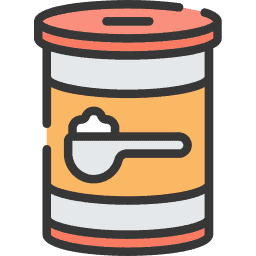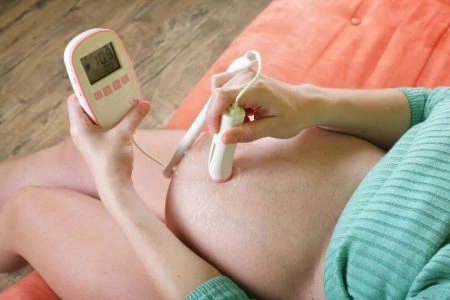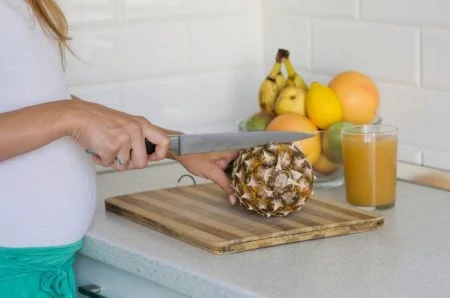Does a warm soak in the tub sound like paradise to you for your pregnancy aches and pains?
A bath can be an excellent way for you to relax and soothe your aching body when you’re pregnant. Many expectant mothers use bathing as a way to unwind each day.
While it is safe for you to take baths when you are pregnant, you need to take precautions to ensure the safety of you and your baby.
Key Takeaways
- Safe bath temperature: Keep bathwater below 100 degrees Fahrenheit to avoid overheating and complications for you and your baby.
- Epsom salt benefits: Can help soothe aches, reduce swelling, and relieve stress during pregnancy, but always consult your doctor before using.
- Bubble baths and bath bombs: Use caution and avoid scented products that may increase infection risks or contain harmful ingredients.
- Bathing throughout pregnancy: Generally safe during all trimesters, but always follow your doctor’s advice and be mindful of water temperature.
Is It Safe To Take a Hot Bath While Pregnant?
It is safe for you to take a bath when you’re pregnant, but you have to make sure the water is at a safe temperature. We cannot stress enough that you must avoid hot baths at all costs.
The American College of Obstetricians and Gynecologists states that bathwater should never be hot enough to raise your body temperature above 102.2 degrees Fahrenheit. Other specialist societies recommend an even lower threshold of 101 degrees (1).
A temperature that high, particularly during the first trimester, can cause numerous complications to occur that will negatively affect you and your unborn baby (2).
If your temperature is above that threshold for more than 10 minutes, the following complications can occur:
- Dizziness.
- Weakness.
- Drop-in blood pressure.
- Dehydration.
- Birth defects.
A drop in blood pressure can deprive your baby of essential nutrients and oxygen. If the drop in blood pressure is significant, sudden, lasting, or symptomatic, it can lead to complications like stillbirth or low birth weight (3).
If you notice you are getting hot in the bath, your skin is turning red, or you are sweating, the water is too hot. A warning sign will also be if you stop sweating. To avoid overheating, you should try to limit your baths to shorter amounts of time, preferably less than 10 minutes. Try not to submerge your upper chest, arms, shoulders, and head, making yourself less likely to overheat.
Even if your bath is extremely relaxing, don’t push your limits. A couple of minutes of relaxation is not worth permanent damage to your baby.
Pro Tip
Many mothers purchase water thermometers to measure the temperature of their baby’s bath. You can be proactive and buy one to protect your baby both before and after their birth.
Why Are Hot Baths Dangerous?
Apart from the reasons mentioned above, it is dangerous for you to take a hot bath during pregnancy because as your temperature increases, so does the temperature of the womb. Your baby depends on you for temperature regulation because they cannot yet do this on their own.
The womb is deeper within your body, so it already has a slightly elevated temperature compared to yours.
There is a reason that pregnant women are advised to avoid saunas, jacuzzi, and hot tubs — they are just too hot!
Bathing Throughout Pregnancy
You can take a bath throughout your entire pregnancy unless a doctor has specifically directed you otherwise. Certain precautions and risks can occur within the different trimesters, so it is important to be aware of these.
1. First Trimester
During the first trimester, it’s okay to take baths, but some doctors advise against it. If you have a high-risk pregnancy, it may be in your best interest to avoid baths during the next few weeks.
The first trimester is vital for your baby because this is when their organs are developing. Overheating can cause many underlying issues that can lead to birth defects.
Overheating at any time during your pregnancy is dangerous but especially when organs like the brain and spinal cord are developing (4).
2. Second Trimester
The second trimester is also an okay time for you to take a bath — as long as your doctor has not directly told you to avoid bathing.
Once again, you need to make sure you are regulating the temperature of your bathwater. Hot water can lower your blood pressure, which can decrease the supply of oxygen and nutrients to your baby and lead to dizziness and nausea.
These symptoms can put you at risk of falling, which will put both you and your baby in danger. You need to use caution at all times, and limit your exposure if you begin to feel even the slightest bit overheated.
If you are not fully submerged, you may not realize how hot your water is. Most of the time, the upper half of your body is not submerged in the water, so you will not feel as hot. If your belly is submerged, the temperature of your womb will increase.
Test It Out
3. Third Trimester
During the third trimester, you will feel all those aches and pains your pregnancy journey has created. Your growing baby will be taking a toll on your body, and you are going to need something to help you relax and feel refreshed.
You can take baths in your third trimester; just watch the water temperature as you would in the other trimesters.
Some expectant mothers are concerned that the bathwater might enter their uterus during this trimester. Your baby is well-protected by the amniotic sac, so this is impossible.
If your water has broken, you need to avoid bathing because this means your amniotic sac has ruptured. Your baby is no longer protected from the bathwater.
You have likely reached the point in your pregnancy where your feet seem to have disappeared. Your new belly can make getting in and out of the bathtub difficult.
If you are even the slightest bit hesitant about getting in and out of the tub, have someone on hand to help you. There is no shame in not being able to do this by yourself, so don’t be afraid to ask for help. Your growing baby and the slippery surfaces can set you up for one mighty downfall.
Be Aware
Bathing With Epsom Salts During Pregnancy
Epsom salt is actually not a salt; it is composed of magnesium sulfate. This naturally occurring element has many benefits for the body, even during pregnancy.
How To Use Epsom Salt
You should add approximately two cups of Epsom salt to your warm bath. The substance will dissolve relatively quickly, and you can soak in it for approximately 10 to 15 minutes (5).
You can add Epsom salt to your bath a couple of times a week to reap the full benefits.
Benefits of Epsom Salt
Many athletes bathe in Epsom salt to help relieve muscular aches. It is safe to say that as an expectant mother, you will have your fair share of these. When it comes to that back pain you are feeling, and those leg cramps, a bath with Epsom salt can help! Other benefits associated with Epsom salts include:
- Soothes your skin: Epsom salt can help soothe stretching skin. It can also possibly help with reducing stretch marks. It is known to increase the rate at which cuts and minor sunburns heal, which can be good to know if you become clumsy as you gain weight during pregnancy. Also, it can provide relief from itching.
- Stress reliever: The magnesium found in Epsom salt is known to be a natural stress reducer and can help you feel calm. Reduced stress levels can greatly benefit you and your baby.
- Reduces swelling: Epsom salt can help reduce fluid levels in your body and decrease the swelling your pregnancy has caused. It is more effective if you combine massage of the swollen areas with soaking in the salts. You should also elevate your feet once your bath is finished for the best results.
- Hemorrhoid relief: Epsom salts have anti-inflammatory properties that can help reduce hemorrhoids and ease your pain.
Where Can You Find Epsom Salt?
You can find Epsom salt at most grocery stores or pharmacies. There are many brands on the market, and most of them are relatively the same, but some have fragrances listed among their ingredients. During pregnancy, for safety reasons, it is in your best interest to stick specifically with the unscented Epsom salt that has no oils or herbs added.
Using Epsom salt in your bath is generally safe, but it never hurts to seek your doctor’s permission before incorporating it into your bath time routine.
Epsom salts may increase the water temperature, so it’s vital that you are extremely cautious. It may be beneficial for you to initially lower your water temperature when you use the salts and double-check by using a baby thermometer.
While taking an Epsom Salt bath is considered safe, you should bear in mind that on rare occasions, an allergic reaction can occur. If you are soaking in an Epsom salt bath and you notice your skin becomes itchy and red, or if you notice a rash, get out of the bath immediately and get in touch with your health care provider. You should also avoid submerging any part of your body with broken skin.
If you are a first-time user, fill the tub and add the Epsom salt. Test the water on your skin for a few minutes. If there is no skin reaction, you can soak in that bathtub.
Editor's Note:
Dr. Irena Ilic, MDAre Bubble Baths Off Limits During Pregnancy?
Take a moment and picture the pure bliss you will get from soaking in that warm bathtub. Now imagine how much better that bath will be when you add your favorite bubble bath.
It is okay for you to take bubble baths while pregnant, although there are a couple of risks.
Allow yourself some time to fully pamper yourself and make the most of your bath time experience. Your days of peace and quiet and taking a bath whenever you want are numbered.
A little relaxation can do your body good. Remember not to stay in that bathtub too long, or you can put yourself and your baby in danger.
You are also more prone to urinary tract infections (UTIs) and yeast infections during pregnancy. Using a bubble bath can significantly increase your chances of contracting one of these infections.
For that reason, try to save bubble baths for when you need an indulgence, not as an everyday way to cope with stress. Also, to prevent UTIs, you should avoid using scented soaps and bathing cosmetics and make sure you drink enough water.
Another risk associated with using bubble baths is that they can cause the bathtub to become slicker. Your new center of gravity is enough to make you lose balance already, and adding in the slickness of the bubbles can be an accident waiting to happen.
Can a Warm Bath Induce Labor?
Some midwives suggest taking a warm bath can help naturally induce labor. This is true, but it is not the warm water that induces the labor.
A bath helps you relax and calm your emotional state, which can promote the induction of labor.
Some women who are just waiting for their water to break are prolonging the process by being stressed out or scared and not allowing their body to prepare itself naturally.
A soothing bath may be all you need to help you move one step closer to meeting your precious little one.
Don't Worry
Bathing While Bleeding
You should never bathe if you are experiencing bleeding — at any point in your pregnancy.
If you are pregnant and experiencing significant bleeding, it is vital you seek medical attention immediately because there is an underlying issue that needs to be addressed.
If you are experiencing light bleeding, this can be normal. You should consult with your doctor to ensure your bleeding is not caused by anything serious.
Don’t worry if you have light bleeding because this happens in 20 percent of pregnancies within the first trimester. Some women even experience light bleeding throughout their pregnancy. During this time, you can take a bath as long as it’s not too hot, but you should avoid using tampons and having sex.
Using Bath Bombs While Pregnant
Bath bombs are a fun trend with amazing benefits.
The good news is that most bath bombs are actually safe for you to use during pregnancy. But you should always look at the safety of any bath bomb you choose and consult your health care provider.
Some bath bombs include ingredients targeted specifically at pregnant women, but some contain ingredients that are listed as fragrances and can be harmful (6).
Many bath bombs include essential oils. Although there are some risks associated with these, they are typically due to ingestion or direct skin contact. Soaking in a bathtub with minimal concentrations of these oils should not be harmful. Still, the use of essential oils in pregnancy is controversial, so you should always research any essential oils in the products you’ll be using.
Some essential oils can be harmful during pregnancy, while others might help with certain discomforts (7). In general, you should avoid them during the first trimester. It is always in your best interest to seek permission from your doctor before choosing to use potentially questionable products during pregnancy.
Bath Salts And Pregnancy
Many doctors advise against using bath salts because some include dangerous essential oils.
If you are set on using bath salts, you should make sure you look over all the ingredients and their possible side effects. You should also seek consent from your doctor.
The best alternative to using bath salts would be to use Epsom salts. As discussed above, they are safe and have many positive benefits.
FAQs
The Bottom Line
Your pregnancy journey will cause you to experience all kinds of aches and pains you never knew were possible. In the end, they will all be worth it, but you deserve relief.
You can safely take baths as long as your doctor has not advised you otherwise and you carefully choose your bath products. Baths can enhance your mood, relieve stress, and soothe your muscles and fatigued body. All of these can promote a happy and healthy pregnancy.
The most important thing to remember is you must be cautious of your water temperature. A hot bath can have detrimental effects on your little baby. So, enjoy a warm bath, but don’t overdo it.









